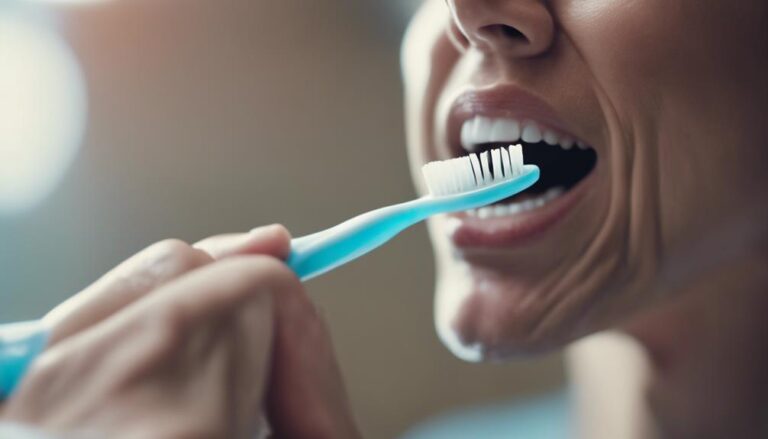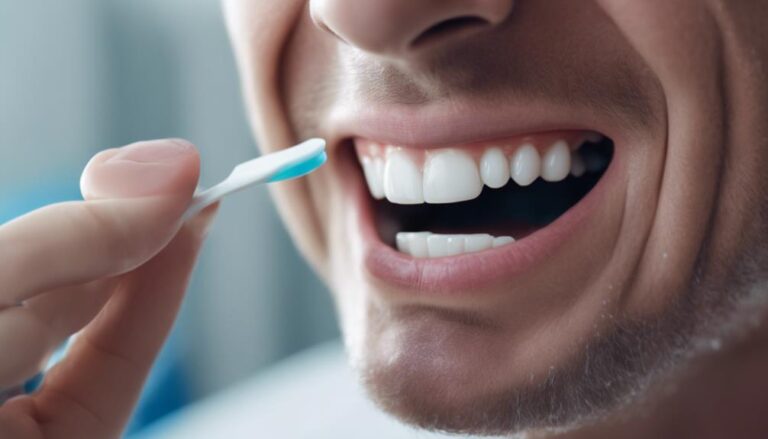Bacteria thriving in the pockets between teeth and gums due to gum disease are the main reason for bad breath. When plaque builds up, causing inflammation and pockets, food becomes trapped, leading to foul odors. The progression of gum disease can worsen bad breath, impacting overall oral health. Understanding the impact of periodontal disease on breath freshness is essential for seeking professional help. Maintaining good oral hygiene practices and seeking timely treatment can combat chronic bad breath caused by gum disease. Discover more about the relationship between gum disease and bad breath to promote excellent oral health.
Key Takeaways
- Plaque buildup and bacteria in gum pockets lead to bad breath.
- Inflammation, pus, and tissue breakdown in gums contribute to halitosis.
- Regular brushing, flossing, and antibacterial mouthwash help prevent bad breath.
- Professional cleanings remove plaque, bacteria, and tartar causing bad breath.
- Gum disease progression without treatment worsens bad breath and oral health.
Bacteria in Gum Disease
One of the key factors contributing to bad breath in gum disease is the presence of harmful bacteria in the oral cavity. In a healthy state, the oral microbiome is a vital ecosystem of various bacteria that coexist harmoniously. However, in cases of gum disease, there’s a bacterial imbalance where harmful bacteria dominate, leading to foul-smelling breath.
The oral microbiome plays an essential role in maintaining oral health. When the balance is disrupted, typically due to poor oral hygiene, plaque and tartar can accumulate, providing a breeding ground for harmful bacteria. These bacteria release volatile sulfur compounds, which are responsible for the unpleasant odor associated with bad breath in gum disease.
Understanding the role of bacterial imbalance in gum disease and bad breath underscores the importance of maintaining good oral hygiene practices. Regular brushing, flossing, and dental check-ups are essential to prevent the proliferation of harmful bacteria and maintain a healthy oral microbiome. By promoting a balanced oral microbiome, individuals can effectively combat bad breath associated with gum disease.
Plaque Build-up
Plaque build-up on the teeth serves as a vital breeding ground for harmful bacteria, playing a significant role in bad breath associated with gum disease. When plaque accumulates along the gumline and between teeth, it creates an environment where bacteria thrive and release foul-smelling compounds. This can lead to chronic bad breath if left untreated.
Proper oral hygiene practices are essential in preventing plaque build-up and subsequent bad breath. Regular brushing techniques, such as using a soft-bristled brush and gentle circular motions, can effectively remove plaque before it hardens into tartar, which is more challenging to eliminate. Additionally, incorporating flossing into your daily routine is crucial for reaching areas that a toothbrush might miss.
Inflammation of Gums
The inflammation of gums, also known as gingivitis, is a common early sign of gum disease that can contribute to persistent bad breath. When gums become inflamed, they appear red, swollen, and may bleed easily, especially during brushing or flossing. This inflammation is often due to the buildup of plaque, a sticky film of bacteria that forms on teeth.
If left untreated, gingivitis can progress to a more severe form of gum disease called periodontitis, which can lead to the formation of pockets between the teeth and gums.
Prevention methods for gingivitis include maintaining good oral hygiene practices such as brushing twice a day, flossing daily, and visiting the dentist regularly for professional cleanings. Treatment options for gingivitis may involve more thorough cleanings to remove plaque and tartar, as well as using antimicrobial mouth rinses to reduce bacteria in the mouth. In severe cases, a dentist may recommend more intensive treatments to manage gum disease and prevent its progression.
Pockets Forming
As gum disease progresses, pockets may form between the teeth and gums, creating spaces where bacteria can accumulate and contribute to persistent bad breath. These pockets, also known as periodontal pockets, are a vital aspect of advanced gum disease. Preventing the formation of these pockets is essential in maintaining oral health and preventing bad breath.
Effective oral hygiene maintenance is key in preventing pockets from forming. Regular brushing and flossing help remove plaque, the sticky film of bacteria that can harden into tartar and lead to gum disease. Proper technique is essential – brushing gently in circular motions and flossing carefully to reach areas between the teeth where bacteria thrive.
In addition to daily oral care, regular dental check-ups are essential to monitor the health of your gums and catch any signs of gum disease early. Your dentist can provide professional cleanings to remove tartar buildup and offer guidance on improving your oral hygiene routine to prevent pockets from forming. By prioritizing oral hygiene maintenance, you can help keep your gums healthy and reduce the risk of developing bad breath associated with gum disease.
Food Trapped in Gums
When bacteria accumulate in the pockets formed by advancing gum disease, food trapped in gums can exacerbate bad breath. Ensuring effective flossing techniques is important in preventing food particles from getting stuck between the teeth and gums. Proper flossing helps remove debris that can serve as a food source for bacteria, reducing the chances of bad breath caused by decaying food remnants.
Maintaining good oral hygiene habits is essential to prevent food particles from lingering in the gums. Brushing teeth at least twice a day and incorporating flossing into the daily routine can greatly reduce the buildup of food debris in the gum line. By practicing consistent oral care, individuals can minimize the opportunity for bacteria to thrive in these trapped food particles, thereby helping to alleviate bad breath associated with gum disease.
Incorporating effective flossing techniques and maintaining regular oral hygiene habits are key components in preventing food from becoming trapped in the gums, ultimately contributing to fresher breath and improved gum health.
Anaerobic Bacteria Growth
Anaerobic bacteria thriving in the pockets of diseased gums are a significant contributor to persistent bad breath. These bacteria, which don’t require oxygen to survive, multiply rapidly in the absence of proper oral hygiene. As the bacterial growth continues unchecked, it leads to the release of volatile sulfur compounds that emit foul odors. Maintaining good oral hygiene practices, such as regular brushing, flossing, and dental check-ups, is essential in preventing the buildup of these harmful bacteria.
Neglecting oral hygiene allows anaerobic bacteria to flourish, creating an environment ripe for bacterial growth. The gums provide a warm and moist environment where these bacteria can thrive, causing inflammation and damage to the surrounding tissues. Bacterial growth in the diseased gums exacerbates the production of malodorous compounds, resulting in chronic bad breath that can persist despite efforts to mask it with mouthwash or mints.
To combat bad breath originating from gum disease, it’s important to address the root cause by improving oral hygiene practices to reduce anaerobic bacterial growth. Regular dental cleanings and proper brushing and flossing techniques are essential in preventing the accumulation of bacteria in the gums, ultimately leading to fresher breath.
Sulphur Compounds Produced
The production of foul-smelling sulphur compounds is a key factor in the persistence of bad breath associated with gum disease. These compounds, such as hydrogen sulfide and methyl mercaptan, are byproducts of the metabolic processes of anaerobic bacteria that thrive in the pockets formed between the teeth and gums when gum disease is present.
Here are three essential aspects to take into account when addressing the issue of sulphur compounds and bad breath in gum disease:
- Oral hygiene: Maintaining proper oral hygiene practices, including regular brushing, flossing, and professional cleanings, can help reduce the buildup of plaque and tartar where these bacteria reside, consequently decreasing the production of sulphur compounds.
- Mouthwash effectiveness: Choosing an antimicrobial mouthwash can aid in controlling the bacteria population in the mouth, limiting their ability to produce the malodorous sulphur compounds responsible for bad breath.
- Dietary choices, bacterial balance: A balanced diet that’s low in sugars and rich in vegetables can promote a healthier bacterial balance in the mouth, potentially reducing the prevalence of sulphur-producing bacteria and the resulting bad breath.
Tongue Coating
What role does tongue coating play in contributing to bad breath associated with gum disease? Tongue coating refers to the accumulation of debris, bacteria, and dead cells on the surface of the tongue. This buildup can harbor foul-smelling bacteria that produce volatile sulfur compounds, contributing to bad breath. Maintaining good oral hygiene practices, such as regular tongue cleaning or scraping, can help reduce tongue coating and prevent the associated bad breath.
To understand the impact of tongue coating on bad breath, let’s look at how oral hygiene and tongue scraping can influence this process:
| Factors | Impact on Bad Breath | Recommendation |
|---|---|---|
| Oral Hygiene | Removes bacteria and debris, reducing odor-causing compounds | Brush teeth twice daily, floss regularly, and use an antiseptic mouthwash |
| Tongue Scraping | Removes tongue coating and bacteria, improving breath freshness | Gently scrape the tongue from back to front daily |
Dry Mouth Effect
Experiencing dry mouth can greatly worsen bad breath related to gum disease. When saliva production decreases, the mouth’s natural cleaning and antimicrobial properties are compromised, leading to an environment where bacteria thrive and contribute to foul odors. In the context of gum disease, this can exacerbate the condition and lead to persistent bad breath.
Here are three key ways in which dry mouth impacts bad breath in individuals with gum disease:
- Saliva Production: Insufficient saliva fails to wash away food particles and bacteria effectively, allowing them to accumulate in the mouth and cause odor.
- Oral Hygiene: Dry mouth often hinders proper oral hygiene practices such as rinsing and brushing, which are vital for controlling bad breath associated with gum disease.
- Bacterial Growth: Reduced saliva flow provides an ideal environment for bacteria to multiply, leading to the production of volatile sulfur compounds responsible for malodor.
Medications Influence
Medications can greatly influence the occurrence and severity of bad breath associated with gum disease. Some medications have side effects that can contribute to dry mouth, a condition where the mouth produces less saliva. Saliva plays an important role in washing away food particles and bacteria in the mouth, so reduced saliva flow can lead to an increase in bacteria, causing bad breath.
Certain medications, like antihistamines, decongestants, and antidepressants, are known to cause dry mouth as a side effect, exacerbating bad breath in individuals with gum disease. It’s essential for individuals taking these medications to be extra vigilant with their oral hygiene habits to combat the effects on their breath. Proper oral hygiene, including regular brushing, flossing, and the use of alcohol-free mouthwash, can help alleviate bad breath caused by medication side effects.
Smoking and Bad Breath
Smoking can greatly contribute to the presence of bad breath in individuals with gum disease due to its detrimental effects on oral health. As a smoker, I understand the challenges associated with maintaining fresh breath while battling gum disease. Here’s why smoking exacerbates bad breath in individuals with gum disease:
- Poor Oral Hygiene: Smoking can lead to a decrease in saliva production, creating a dry environment in the mouth that promotes bacterial growth and exacerbates gum disease, ultimately causing bad breath.
- Increased Bacterial Growth: The chemicals in cigarettes can alter the oral microbiome, leading to an overgrowth of harmful bacteria that produce foul-smelling compounds, contributing to bad breath.
- Impact of Diet Choices: Smoking often accompanies poor dietary habits, such as consuming sugary or acidic foods that can worsen gum disease. These diet choices can further fuel bad breath by providing sustenance for odor-causing bacteria.
Gum Disease Progression
When gum disease progresses, it can lead to more severe oral health complications that require prompt attention. Prevention and early detection are key in managing gum disease effectively. Lifestyle changes and proper oral hygiene practices play an essential role in preventing gum disease progression. Regular brushing, flossing, and dental check-ups are vital for maintaining gum health.
As gum disease advances, it can lead to issues such as gum recession, bone loss, and tooth mobility. Without timely intervention, gum disease can progress to periodontitis, a more severe form of gum disease that can cause irreversible damage to the gums and supporting structures of the teeth. This highlights the importance of early detection and proactive management of gum disease.
Periodontal Disease Impact
Exploring the impact of periodontal disease on oral health reveals the significant consequences of untreated gum disease. When left unchecked, periodontal disease can wreak havoc on one’s overall wellbeing. Here are three important factors to take into account:
- Oral Hygiene Practices: Neglecting proper oral hygiene practices can exacerbate gum disease. Brushing and flossing regularly are essential to remove plaque buildup, preventing the progression of gum disease.
- Prevention Methods: Implementing preventive measures is key to combatting periodontal disease. Regular dental check-ups, professional cleanings, and maintaining a healthy diet can help prevent gum disease from developing or worsening.
- Gum Disease Treatment Options: Seeking timely treatment for gum disease is paramount. Depending on the severity, treatment options may include deep cleanings, antibiotics, scaling and root planing, or even surgery in advanced cases. Consulting with a dental professional is crucial to determine the most suitable treatment plan.
Understanding the impact of periodontal disease underscores the importance of proactive oral care to maintain excellent oral health.
Chronic Bad Breath
Chronic bad breath, also known as halitosis, can be a persistent and embarrassing oral health issue that stems from various underlying causes. Maintaining good oral hygiene practices, such as brushing and flossing regularly, is essential in preventing chronic bad breath. In addition to oral hygiene, dietary habits play a significant role in the development of halitosis. Certain foods like garlic, onions, and spices can contribute to foul breath odor. Ensuring a well-balanced diet and staying hydrated can help combat bad breath caused by dietary factors.
| Factors Contributing to Chronic Bad Breath |
|---|
| 1. Oral Hygiene |
| 2. Dietary Habits |
| 3. Hydration |
Seeking Professional Help
Seeking professional help is essential for effectively addressing chronic bad breath caused by gum disease. When dealing with persistent bad breath related to gum issues, it’s important to consult with dental experts who can provide targeted solutions. Here are three key steps to keep in mind:
- Oral Hygiene Evaluation: A dental professional can assess your current oral hygiene practices to identify areas for improvement. They can recommend specific techniques and products to help combat bad breath stemming from gum disease. Proper brushing, flossing, and tongue cleaning are important components of a thorough oral care routine.
- Dental Check-Ups: Regular dental check-ups are essential for monitoring gum health and addressing any underlying issues promptly. These visits allow the dentist to detect early signs of gum disease and provide appropriate treatment to prevent further progression. Professional cleanings can also help eliminate bacteria that contribute to bad breath.
- Treatment Planning: Dentists can develop personalized treatment plans tailored to your specific gum disease condition. This may include deep cleanings, medication, or other interventions to combat the underlying causes of bad breath effectively. Adhering to the recommended treatment regimen is crucial for achieving long-term oral health and fresh breath.
Frequently Asked Questions
Can Gum Disease Cause Other Health Problems?
Gum disease can lead to other health problems such as heart disease. It’s essential to maintain good oral hygiene to prevent these issues and safeguard overall health. Neglecting gum health can have serious consequences for the body.
How Can I Prevent Gum Disease From Developing?
Wondering how to prevent gum disease? Consistent oral hygiene, including brushing and flossing, paired with a healthy diet, can help maintain gum health. By taking proactive steps, you can reduce the risk of developing gum disease.
Is Bad Breath Always a Sign of Gum Disease?
Bad breath isn’t always a sign of gum disease. It can result from poor oral hygiene or dietary habits. Regular brushing, flossing, and a balanced diet can help prevent bad breath. Seeing a dentist for check-ups is also essential.
Can Gum Disease Be Reversed With Proper Care?
Gum disease can be reversible with diligent dental hygiene and lifestyle changes. Regular brushing, flossing, and dental check-ups are essential. A balanced diet, avoiding tobacco, and managing stress can also contribute to improving gum health.
Are There Any Natural Remedies for Bad Breath Caused by Gum Disease?
When dealing with bad breath from gum disease, I rely on herbal remedies like tea tree oil mouthwash and dietary changes. Incorporating essential oils like peppermint can freshen breath naturally. Consistency is key for lasting results.
Conclusion
To summarize, gum disease causes bad breath due to the bacteria, plaque build-up, inflammation, and pockets forming in the gums.
If left untreated, food can become trapped in the gums, leading to chronic bad breath.
Seeking professional help is vital to prevent gum disease progression and its impact on overall oral health.
For example, Sarah neglected her gum health, resulting in severe periodontal disease and persistent bad breath.
Don’t wait until it’s too late – prioritize your gum health today.






